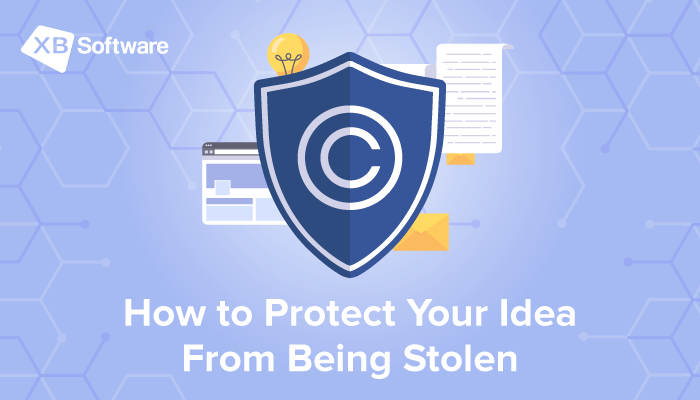A good software idea can provide your company with a competitive advantage on the market. Therefore, it should be considered as one of the valuable assets of your company as well as the products that you offer to your clients. You should start worrying about how you’ll protect your software idea long before the first line of code is written.
To help you with creating a list of measures that will help to protect your ideas from being stolen, we’ve gathered together the most commonly used of them in this article.

Protect Your Software Idea via the Copyright
Copyright is probably the first thing that comes to one’s mind when we talk about the measures that help to protect intellectual property from being stolen. Copyright guarantees that the law will protect your right to own an idea. It goes into effect right after you start creating the product. You can’t copyright an abstract idea since copyright protects the so-called expression of your work. Regarding software, it means that you can protect the source code or UI elements of your app. Copyright will protect your idea in case if someone creates an exact copy of your code. If someone creates a product that looks extremely similar to yours, copyright protects you as well, but it will be pretty hard to prove that your rights were violated in this case.
When you hold the copyright that protects your idea, you’re free to do whatever you want with your software product. You can distribute it, create derivative software, share, and make copies. Copyright terms may vary. Sometimes it’s possible to use copyrighted software for nonprofit and educational purposes. The duration of copyright protection of your idea depends on the laws of a particular country. For example, in the United States, it can protect the invention from being stolen for the lifetime of the author plus 70 years. Copyrighting the idea is a relatively inexpensive way to protect your product comparing to the other options. Copyright can be considered as the most common approach to protection against direct copying.
Get a Software Patent
Applying for a patent that will protect your software idea can be a pretty hard task. The reason is that your software idea should meet several criteria. It should be useful, innovative, and non-obvious. Sometimes, the only way to define if the patent makes sense is to contact an experienced specialist in the field of intellectual property. The whole procedure is pretty complex by its nature since it implies that a patent can only protect a unique invention that has some non-obvious functionalities. Thus, it may take for several years to get a software idea patent. After getting the patent, you can be assured that it will protect your software idea against any variations and independent development of the similar product.
If you want to protect your product using a patent, you should remember that this option has some disadvantages. Besides the mentioned time losses, you’ll have to spend some money to get the patent. You should keep in mind that patenting your idea may cost more than developing the product itself. Applying for a patent can be too expensive for small companies or startups. Therefore, you should be sure that game is worth the candle. But it’s always possible to get a provisional patent that will temporarily protect your software idea. This option is usually chosen in a situation when court case results are pending, or the overall situation is not transparent enough due to new specifications and standards. A provisional patent lasts for one year and provides you with the time required to apply for a non-provisional patent.
Patenting your idea guarantees that you as an author of the invention will get exclusive rights in exchange for providing a detailed description of your invention to the public. A software idea patent can be pretty helpful in case you want to buy some time before bringing your product to competition and do not fear that anybody else will implement the same idea before you.
Use Non-Disclosure Agreement
When you apply for the services of a software development company, it’s a common practice to ask its representatives to sign a Non-Disclosure Agreement (NDA). NDA helps to protect your product, but it can be a pretty tricky thing. Thus, it’s better to consult with the attorney before preparing the agreement.
The main idea behind NDA is to limit the number of people that will be aware of the details of your software idea. Such agreement helps to protect such aspects of your project as design documentation, requirements documentation, pricing policy, and so on. Revealing these details to any third-party can harm your business. One of your competitors can implement unique software features before you and deprive you of the advantage in the market. Therefore, you should disclose your software idea only to the people who directly participate in the development process such as developers, business analysts or project managers. NDA provides additional protection measures that help to prevent undesirable consequences.
Each participant that signed an NDA promises not to release the info that will be shared during the work on the project. In case if some data related to your idea is divulged to a third party, you’ll be free to claim a breach of contract.
Clarify Who Will Own the Code
If you hire a company to implement your software idea, you should pay due attention to the ownership issues. It includes not only the source code of the application but also the right of possession over any documentation produced during the software development life cycle. Before singing the software development agreement, you must assure that it assigns all rights to you.
Here’s another thing to remember. Development tools, platforms, and technologies that your vendor uses during the development process also play an important role. Ask if the development company uses any third-party libraries or platforms to develop your app. You should make sure that you’ll get the right to license and use all these technologies in case you decide to stop working with this software vendor in the future.
Read also Should the Customer Own the Source Code for the Application?
Protect Your Software Product with Trademarks
Your software idea may have different forms. It can be an app for intracompany use such as resource planning tool or a web application for a wide target audience. In the second case, besides the source code, there’s another important part of your product that requires special attention.
It’s pretty hard to create a unique and eye-catchy design that will make your application recognizable. You can easily identify such brands as Twitter or Instagram by barely looking at their logos. In case of custom web application development, a trademark can protect you from the situation when a rival company providing similar services copies some visual aspects of your product to trick new customers and make them use their product. As a result, you can lose some potential clients which will decrease the income of your company.
Trademarks help to protect the name of your app, slogan, icons, and logos from being used by any third-parties.You can trademark the name of features and services provided by your application as well. Such measures will provide additional protection from possible lawsuits or legal issues. The process of trademarking is one of the most affordable protecting measures among the considered options. It won’t cost you a lot, and there are plenty of law consultancies that will help you to understand all the intricacies.
Document Everything
Take the documentation process seriously. It’s recommended to write down everything related to the idea you have. All the documentation created during the work on the project should be saved. In case of unpredicted difficulties, each piece of documentation will help to confirm your stance in court. Everything from the application’s code to the results of meetings with the development team has potential value, so don’t let things slide and save even the smallest details related to your software product. You can’t predict which exact fact will help to support your standpoint, so keep in mind that there’s no such thing as unimportant documentation when it goes to the safety of your software idea.
Check the People You’re Working with
The process of application development implies that you’ll disclose your software idea to the people you’re going to hire. Therefore, it’s important to make a background check of your potential software vendor before even applying for any services to protect your intellectual property. It’s pretty easy to find out whether a software development company has a good reputation among the former clients or there were any ethical issues.
You must ensure that you work with trustworthy people who won’t harm your business by leaking information related to your software idea. These measures concern not only the developer but every other person involved in the project, so don’t forget to check all your investors, possible clients, and contractors as well. Nowadays, it’s not so difficult to get acquainted with the feedback or find some info on disputes with previous business partners, so, the research won’t cause significant delays.
Conclusion
Your software idea can be considered as a valuable asset even before you implement it in the form of the ready-to-use product. Therefore, right after you created a breakthrough concept for your future app you have to plan how you’ll protect this idea from being stolen. Remember that each aspect of your idea is valuable and should be taken into account. Besides the source code, there are logos, icons, and slogans that you should protect since they form a single perception of the product. That’s why, besides dealing with the code ownership issues, you should also protect your intellectual property by trademarking of your brand. Discuss all the issues with a legal consultant to not violate anyone’s patent that already exists. Only having the full understanding of all the aspects related to the protection of your software idea you can begin discussing a software development agreement with your vendor.

